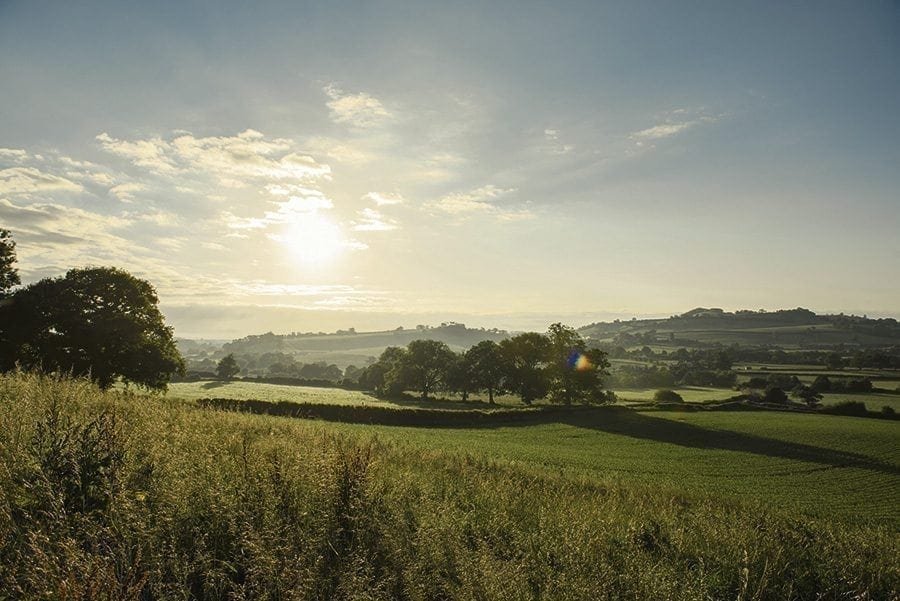All dairy farms need to cool milk from body temperature to 2-3ºC as quickly as possible; at Wyke, the tank of iced water used to get the milk’s temperature down is powered by solar panels on the barn roof. ‘I always show other farmers this set-up’, Rich told us. ‘Lots of farmers have gone off to do the same on their own land. It’s a no-brainer. Even if they’ve only got space for a small array, they’ll save money because they’ll use all the energy they generate.’
That’s not all Wyke Farms is doing to encourage farmers to switch to solar: since last summer, it has offered preferential rates to suppliers who use renewables, and 17 out of around 100 farms are now receiving an extra 2p per litre (£2,000 for an average farm) from Wyke Farms as a result.
These neat solutions are helping local farmers start the transition to sustainable agriculture – but the thing that makes Wyke really stand out is hidden in a valley 1.5 miles away, landscaped in such a way that it’s almost invisible from the road.
‘Waste is fuel’
Wyke Farms’ anaerobic digester (AD) plant, installed in September 2013, consists of three huge tanks topped with green domes stretched taut by the pressure of methane that rises up inside. From behind the trees the green mounds could easily be an extension of the Somerset hills that roll around them – but get up close and you’ll appreciate the technical genius of this mammoth operation.
‘We no longer have any waste’, Rich explains, ‘because waste is fuel.’ Excess lactose from the cheesemaking process is pumped underground to the AD plant, where it’s mixed with silage, apple pomace from local cider producers and waste bread. Everything’s got a calorific value and it all needs to be calculated. It’s an exact science and finding the perfect recipe has required lots of trial and error – not least because the ingredients keep changing.
‘We’ve even taken reed bed waste from a local RSPB reserve’, Rich says, ‘and we’ve bought straw from rape crops from local farmers. It’s 60% methane and it’s just left in the field to rot!’
Inside the monster tanks, methane is released as the various wastes are agitated and combined. After rising to the top of the domes, it’s pumped through to a combined heat and power plant (CHP) where it’s burnt to create heat and electricity. These handy byproducts are used to run the AD plant and to produce heat for the dairy.
Because the dairy uses more gas than electricity, the next game-changer at Wyke was the addition of a biogas upgrader. ‘Biogas is approximately 50% methane and 50% CO2’, Rich explains. ‘It’s very happy in the engines on the farm, but it can’t compete with fossil fuels when it comes to calorific value.’
The gas upgrader essentially cleans up the biogas so it can be used on the farm, with any excess sent to the grid to power the local community. It takes out the CO2 and injects an odour into the otherwise undetectable methane.
The addition of the gas upgrading plant in December 2014 allowed Wyke to become 100% self-sufficient, and to supply other farms and businesses. ‘The CO2 we’re extracting can be used as a refrigerant’, Rich tells us. ‘Sainsbury’s uses it in its fridge gas.’
Rich has always wanted the farm to be green, but the vision has only recently become attainable. ‘You can only be as green as the technology that’s available’, he says.
A perfect example is the way Wyke Farms’ produce is transported; the farm runs three electric cars and in the future could run its tankers on compressed natural gas (CNG) produced by the biogas plant. Having a compression plant on site would also give Wyke Farms the opportunity to invest in tractors powered by methane – resulting in complete energy independence on the farm.
‘In the future, sharing of gas power between local farms could be a possibility, particularly where you have a big plant like ours’, Rich says.
‘With 0.3p-0.4p in every penny of milk transport cost being fuel cost, providing a local filling point for neighbouring farms makes economic sense. The associated savings from methane-powered tractors could help dairy farmers reduce their costs, which can only be a good thing. The potential savings are huge.’
Click here to find out more about Wyke Farms’ award-winning cheddar and its green credentials.
 Play Video about This Rock Might Just Save The World
Play Video about This Rock Might Just Save The World Play Video about Play 2 hours of rock
Play Video about Play 2 hours of rock Play Video about Play 2 hours of brook
Play Video about Play 2 hours of brook Play Video about Play 2 hours of sheep
Play Video about Play 2 hours of sheep












































